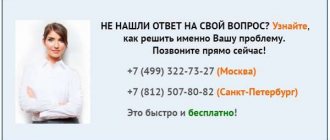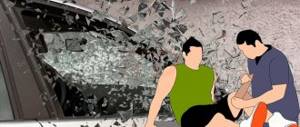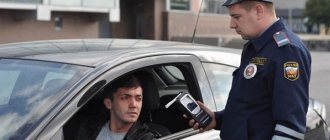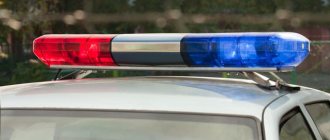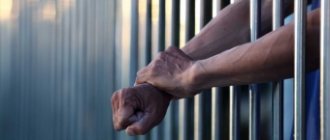When hearing about a medical examination of a driver, most often one imagines a situation where traffic police officers stopped the driver of a car and they suspected that he was intoxicated, and therefore it is necessary to carry out an examination procedure in order to accurately determine whether the person drank alcoholic beverages. But drivers do not always agree to a medical examination. How is a refusal formalized in this case and what could be the penalty? Let's analyze it taking into account judicial practice.
ATTENTION : our lawyer in administrative cases will help in the matter of bringing to justice for refusal of a medical examination: professionally, on favorable terms and on time. Call!
General concepts
To legally draw up a protocol on an administrative offense, in accordance with Part 1 of Article 12.8 of the Code of Administrative Offenses of the Russian Federation (driving a vehicle while intoxicated), the inspector must prove that the driver is actually drunk. To do this, a traffic police officer can, with the consent of the car owner, conduct an examination at the place where the car is stopped, using a special device - a breathalyzer.
What is a medical examination
A medical examination is a set of actions to conduct an examination of the driver by medical specialists, as well as a laboratory test to determine if he is under the influence of alcohol or drugs.
Examination and medical examination are two completely different procedures, but both are aimed at determining the driver’s level of sobriety. Each of them is initiated by an inspector who stopped the car and suspected that the driver was intoxicated.
A traffic police officer can conduct an on-site examination independently using a special device. According to the order of the Russian Ministry of Health dated July 14, 2003, number 308, only a doctor can conduct a medical examination.
If the need for a procedure arose in a hard-to-reach area, you can use the services of a paramedic who has special education and a certificate. The validity of this document is three years. If the certificate is expired, the doctor does not have the right to perform the procedure.
Reasons for carrying out
For a traffic police inspector, the basis for conducting an inspection and removing a driver from driving a vehicle is one or more facts indicating that the driver is drunk.
Main signs of intoxication:
- violation of speech coherence;
- presence of alcoholic odor from the mouth;
- change in skin tone on the face;
- impaired coordination of movements and instability of posture;
- behavior that is inappropriate to the current situation.
The traffic police officer first invites the driver to undergo examination at the place where the vehicle is stopped.
A medical examination may be required in the following cases:
- A driver with signs of alcohol intoxication refused to undergo a test using the device or did not agree with its results.
- The breathalyzer shows a negative result, but the inspector has every reason to believe that the driver is under the influence of alcohol or a drug.
In cases where the driver does not show signs of intoxication, a medical examination for alcohol is prescribed in the presence of circumstances provided for by Order of the Ministry of Internal Affairs No. 780 of August 13, 2012.
Reasons for verification:
- driver refusal to undergo the procedure;
- participation of a motorist in an accident with injuries;
- suspicion that the driver committed an accident.
The procedure for conducting driver examinations
Administrative liability provided for in Articles 12.8 and Part 3 of Article 12.27 of the Code of Administrative Offenses of the Russian Federation occurs in the event of an established fact of consumption of substances that cause alcohol intoxication, which is determined by the presence of absolute ethyl alcohol in a concentration exceeding the possible total measurement error, namely 0.16 milligrams per liter of exhaled breath. air, or in the case of the presence of narcotic drugs or psychotropic substances in the human body.
Ratio between mg/l and ppm = 0.45
1 ppm = 0.45 mg/l
keeping the proportion 0.16 mg/l = 0.16 / 0.45 = 0.3555
0.16 mg/l = 0.356 ppm
Taking into account all the errors of the breathalyzer, the readings should not exceed 0.16 mg/l or 0.356 ppm
There are two types of examination.
Medical examination (MOSO) - is carried out by a doctor (in rural areas - a paramedic) in accordance with the regulatory documents of the Ministry of Health of the Russian Federation.
Alcohol intoxication examination (OSAO) is carried out by a traffic police inspector in the presence of two witnesses or the procedure is recorded on video.
The driver may refuse to be tested for alcohol intoxication, in which case he will be subject to a medical examination or the inspector may release the driver.
The driver may agree or disagree with the results. If the driver does not agree with the results, then the IDPS is obliged to send the driver to a medical facility for a medical examination or the inspector may release the driver.
IDPS may refer the driver for a medical examination if the device readings are negative, having reason to believe that the driver is in a state of drug or other intoxication.
In the Certificate of Examination for Alcohol Intoxication, you must indicate that you do not agree , then the IDPS is obliged to send the driver to a hospital, where the examination will be carried out by a doctor.
The doctor conducts an examination on the basis of Order of the Ministry of Health of the Russian Federation dated July 14, 2003 N 308 “On medical examination for intoxication.” A doctor will be able to establish a state of intoxication only if the breathalyzer reading is more than 0.16 mg/l = 0.356 ppm
.
According to changes to the specified order of the Ministry of Health of the Russian Federation, the doctor makes a conclusion about the state of intoxication despite the absence or presence of clinical signs of intoxication.
Requirements for the procedure of medical examination for intoxication (MOSO).
The examination can be carried out: – in a medical organization that has a license to carry out medical activities indicating the relevant work and services; – in a mobile medical center specially equipped for medical examinations that meets the requirements established by the Ministry of Health and Social Development of the Russian Federation.
The order of the Ministry of Health of the Russian Federation dated July 14, 2003 No. 308 “On medical examination for intoxication” contains the requirements for a mobile medical station: - the salon must be equipped with a rubber track 0.6 m wide and at least 3 m long to conduct a stability test gait; — the height of the cabin must be at least 1.85 m; – door openings must be equipped with steps; – the salon must be equipped with 2 work seats for medical personnel, a seat for the person being examined and a work table. Built-in furniture should include a hanger for outerwear; – the on-board refrigerator for storing biological samples must have a volume of at least 10 liters; – the PPMO salon must be equipped with a washbasin with a supply of clean water of at least 7 liters and a container for collecting waste water with a volume of at least 10 liters, a dry closet, as well as a removable plastic (sealed) garbage container with a capacity of at least 30 liters; – a mobile unit (vehicle) for conducting a medical examination for intoxication must have a registration certificate from the Russian Ministry of Health.
A medical examination is carried out by a doctor (in rural areas if it is impossible to conduct an examination by a paramedic), who has undergone training at a narcological institution on how to conduct a medical examination according to the program approved by Order of the Ministry of Health of Russia dated July 14, 2003 No. 308. This training must be confirmed by a doctor a document indicating the date of issue, the signature of the head of the drug treatment institution and the seal of the institution. The validity period of such a document is 3 years.
The procedure for a medical examination for intoxication consists of two stages: – conducting a clinical examination (describing a person’s behavior, his reactions, pressure, nystagmus and other signs); – the use of special devices to determine alcohol or the collection of biological fluid to determine drug intoxication.
If there are clinical signs of intoxication and a negative result of determining alcohol in the exhaled air, a sample of a biological object (urine) is taken to be sent for a chemical-toxicological study in order to determine the drugs (substances) or their metabolites (with the exception of alcohol) that caused intoxication in accordance with the letter of the Ministry of Health and Social Development RF dated December 20, 2006 No. 6840-VS. The drug (substance) that caused intoxication, with the exception of alcohol, is determined by the results of a chemical-toxicological study of a biological object carried out on the drug (substance) or its metabolites in the prescribed manner. Determination of the presence of narcotic drugs or psychotropic substances is carried out in the chemical and toxicological laboratories of medical organizations that have a license to carry out medical activities, indicating the relevant work (services). The results of chemical-toxicological studies when determining the presence of narcotic drugs or psychotropic substances are documented in a certificate of the results of chemical-toxicological studies, the form and instructions for filling which are approved by the Ministry of Health and Social Development of the Russian Federation (Rules for determining the presence of narcotic drugs or psychotropic substances in the human body during medical examination for the state of intoxication of a person who drives a vehicle, approved by Decree of the Government of the Russian Federation of June 26, 2008 No. 475).
In the case when the state of intoxication is established, according to Art. 27.13 of the Code of Administrative Offenses of the Russian Federation, a vehicle is detained by sending it to a specialized parking lot or by providing another person to drive the vehicle (in the absence of grounds for his removal from driving the vehicle). The driver of the detained vehicle is informed about the place of storage of the detained vehicle and the procedure for its return upon delivery of a copy of the protocol on the administrative offense or the protocol on the detention of the vehicle.
If, based on the results of the examination, the state of intoxication is not established, then the vehicle is not detained, and the proceedings in the case are terminated by issuing a resolution.
Due to the fact that accurate identification of the narcotic substance that caused intoxication takes a long time (up to 12 hours), the vehicle is detained. Once the research results are ready, the driver is called to draw up a protocol on the offense or issue a ruling to terminate the proceedings.
What is the penalty for refusing a medical examination?
Refusal of the initial inspection is not considered an offense. In this case, the driver will be removed from driving the vehicle and, accompanied by an inspector, will have to go to a medical facility.
Lawyers do not recommend drivers to refuse the procedure. If for some reason the detainee does not want to go to the doctor, then this fact will be recorded in the protocol, and then administrative punishment will follow.
Legitimate pretexts
There are no valid reasons why a detainee can refuse an examination at a medical institution. Such a driver automatically becomes a lawbreaker.
Exceptions are allowed only in extremely rare cases. The circumstances that release the driver from administrative liability in case of refusal of inspection are specified in Art. 2.7 Code of Administrative Offenses of the Russian Federation.
These include:
- threat to life, health or property of the driver or another person;
- danger to society or the state;
- there was no other way to prevent the threat.
For example, a person who was driving was taking a seriously ill patient to the hospital and therefore could not undergo an examination due to an emergency. Such circumstances have signs of extreme necessity, so the driver cannot be deprived of a driver’s license. However, the presence of a valid reason will need to be confirmed by witness testimony, an audio recording of a conversation with an inspector, or a video recording from the recorder.
The refusal will be legal if the following conditions are met:
- absence of two witnesses;
- the inspector did not provide the necessary conditions for the examination;
- no signs of alcohol intoxication.
The presence of grounds for conducting an examination in the hospital must be confirmed by the witnesses present. Violations committed by a traffic police officer must be recorded in the protocol; their presence in the document confirms the illegality of his actions.
Consequences
Refusal to undergo a medical examination without legal grounds leads to a fairly serious punishment in the form of a fine and deprivation of the right to drive a vehicle for a period of 1.5 to 2 years.
Procedure for registering a refusal to undergo a medical examination
- If there is reason to believe that the driver is intoxicated, subject to compliance with the established procedure ( first offer to breathe into a breathalyzer ), he should be asked to undergo a medical examination.
- If the driver refuses , the traffic police officer must draw up a protocol on an administrative offense, which must record the fact of the person’s refusal to undergo an alcohol intoxication test. The referral must be made in the presence of two witnesses or a video recording must be made.
- The refusal can be expressed by a person to either a traffic police inspector or a medical professional. The medical worker issues a corresponding refusal of medical treatment and makes a note in the journal.
- You should carefully read the documents drawn up by traffic police officers to ensure that they do not contain false information.
Where is the intoxication test carried out?
If the traffic police inspector has a breathalyzer, the examination can be carried out immediately after stopping the vehicle or in the cabin of the guard car. The test can be carried out at the nearest traffic police post or in a police department if the inspector does not have a special device.
How does the procedure work?
A citizen undergoing examination has the right to study all documents for the device and conduct an inspection of it. The documents must contain a verification note, and the device must bear the stamp of a state verifier. The tip of the device must be sterile.
The Order of the Ministry of Internal Affairs specifies the following procedure for conducting an initial examination:
- After detecting signs of intoxication, the traffic police inspector records the driver’s condition using a video camera.
- Testing is carried out using a breathalyzer.
- If the device confirms the presence of alcohol intoxication, then a protocol is drawn up on a special form, which indicates the date, time of compilation, place and circumstances under which the initial check was carried out, as well as the grounds for referral for a medical examination.
- The motorist must personally sign the protocol.
Two witnesses present during the inspection must clearly see how the motorist breathes into the device. To obtain a positive result, the permissible alcohol content in exhaled air should not exceed 0.16 mg/l.
Modern breathalyzers are able to instantly print out the results of the examination. After that, a paper check, which must have the signatures of the inspector and two witnesses, is attached to the inspection report.
If in the future you plan to go to court to return the certificate, then the following must be written in the act: “I did not drink alcoholic beverages, I do not agree with the charges.” After this, at the end of the document you need to put the exact time, date, full name and personal signature.
The car owner has the right to receive copies of the protocol and the act of removal from driving the vehicle. There is no point in refusing to put your signature on the document; it is better to write: “I do not agree with the protocol.”
If the motorist still refuses to sign the document because he does not want to admit the fact of intoxication, then, in accordance with the Order of the Ministry of Internal Affairs, a medical examination becomes a mandatory event. For an innocent person, a check at a specialized institution is an opportunity to prove his case.
How to avoid deprivation of rights for refusing a medical examination?
A person may refuse a medical examination if the inspector’s demands are illegal, but subsequently in court it will be necessary to prove that the demands were illegal, including by identifying violations on the part of the inspector. A preliminary objection to the protocol on bringing to administrative responsibility is a good help here, see the sample at the link.
In accordance with Art. 27.12 of the Code of Administrative Offenses of the Russian Federation and clause 3 of the Rules approved by Decree of the Government of the Russian Federation of June 26, 2008 No. 475, a traffic police officer must remove the driver from driving a vehicle if he has signs that he is drunk, namely,
- ♦ smell of alcohol from the mouth;
- ♦ instability of posture;
- ♦ speech impairment;
- ♦ a sharp change in the color of the skin of the face;
- ♦ behavior inappropriate to the situation.
When traffic police officers make a decision to remove a driver from driving a vehicle, 2 witnesses must be present or a video recording must be made, and an appropriate protocol must be drawn up.
The inspector must ask the person what is called “breathing into the snorkel” to determine the alcohol vapor.
If a person refuses to be tested for alcohol intoxication, then in this case the traffic police inspector must invite the person to undergo a medical examination.
It is worth noting that referral to the Moscow Region is carried out only if:
- the driver refuses to breathe into the tube, this is called an alcohol intoxication test;
- if the driver breathes into the phone and does not agree with the results;
- if the inspector has every reason to believe that the driver is intoxicated, however, during the examination the device showed a negative result.
Violation of the procedure for sending for examination may lead to the further termination of the proceedings in court.
Procedure for medical examination
To obtain reliable results, it is important that the study is conducted by a narcologist or a certified medical professional who has undergone appropriate training. In this case, the presence of a nurse who collects tests is mandatory.
Progress of the medical examination procedure:
- During the test, the doctor will ask the driver to breathe into a breathalyzer, then begin taking blood and urine samples to conduct a drug test.
- The law does not prohibit the driver from filming what is happening. If possible, it is necessary to accurately record what is happening in order to avoid possible problems in court if the driver decides to prove the illegality of the actions of the doctor or inspector.
- If the permissible limit of 0.16 mg/l is exceeded during a breathalyzer test, you will need to take the test again. This will be possible after 20 minutes, but not earlier.
- The driver is recognized as drunk only after the second test confirms that the alcohol level in the exhaled air is exceeded. The doctor does not have the right to conduct a breathalyzer test a third time.
- The nurse takes a urine sample to check for drug content. The medical facility performs a rapid test on site, and then the sample is sent to the laboratory for re-testing.
- The detainee either submits a urine sample within thirty minutes or has a blood sample taken.
- If drugs are detected in the urine or blood, the driver is declared drunk.
After the examination, the doctor must draw up a report of the procedure, attaching printouts of the results of the breathalyzer test. Absolutely all columns of the document must be filled out, and if errors were made, the doctor does not have the right to make corrections. He is obliged to draw up the entire act again. It is legal to rewrite a document until the owner of the vehicle receives a copy of the document, certified by the signature of a physician and the seal of the institution.
If the result is positive, that is, the driver was not intoxicated, then the inspection report must be kept, it will be strong evidence for the court. When a medical examination shows that a citizen did not drink alcohol, the inspector is obliged to return him to the place where he was suspended from driving.
Signs that should alert you:
1) Appearance that raises suspicion.
2) Behavioral disorders.
3) Strange answers to basic questions: “Why are you selling your apartment?” and “Where are you going to live after the sale?” A sane person answers them very clearly. Otherwise, the answers may be illogical and reveal mental deviations or hidden intentions.
The seller can appeal to the fact that he has a driver’s license or the right to carry a weapon, and this indicates that he is recognized as mentally healthy. However, having a driver's license does not guarantee that a person is fully aware of the legal consequences of the transaction.
Unfortunately, there is such a thing as blackmail of the buyer by the seller, threats of further challenging the transaction. Much more often, such challenges are carried out by “black lawyers” than by the former owners themselves. Usually in such a case it is citizens who are registered in a psychoneurological or drug treatment clinic who appear, since this category of people is most easily interested in winnings from the termination of the transaction, or they are not at all aware of the manipulations being carried out with their apartment. In such cases, when it is known for sure that a person is registered, the examination should be carried out by the attending physician. It is the attending physician who knows exactly the dynamics of the disease, its severity and can accurately say whether a person understands the meaning of his actions or not.
The examination of the transaction must be carried out by specialists who have valid certificates of a psychiatrist, narcologist and forensic psychiatrist, a certified specialist - a doctor who practices in the field of psychiatry.
Upon arrival, a professional expert must present original licenses confirming his qualifications. Paying for services in advance and keeping the receipt is good evidence that the examination was ordered and completed on time. You can present the payment receipt to the court along with other materials. The cost of a medical examination may vary depending on the number of individuals being examined and other factors. If the court subsequently does not invite your expert to the hearing, you can make a request to do so yourself. Certificates from the dispensary, the conclusion itself, the presence of an expert at the trial - all this will significantly increase the chances of proving your good faith and that the seller was of sound mind and normal condition during the specified legal period.
Also, if necessary, the expert who issued this conclusion may be invited to court as a witness. Knowledge of the nuances and consequences of this procedure is extremely important for the safety and well-being of the buyer of real estate on the secondary market, since it is included in the concept of the “legal purity” of the purchased property.
Responsibility and sanctions
In addition to deprivation of rights, additional sanctions may be applied to the driver if he does not have the right to drive a vehicle or has previously been deprived of it.
In this case, the detainee is subject to administrative arrest for a period of ten to fifteen days. Persons to whom administrative arrest, in accordance with this Code, cannot be applied, are subject to a fine of 30,000 rubles.
The Code of Administrative Offenses of the Russian Federation does not provide for an amnesty for such cases, so it will not be possible to be released on parole. After the expiration of the period of deprivation of rights, in order to obtain a new license, you will have to spend a certain amount on undergoing a medical examination and passing a traffic knowledge exam. The vehicle will be detained and transported to a special parking lot, so you will also have to pay for car storage and towing services.
Organization of protection
A driver who does not agree with the actions of a police officer can prove in court the validity of his refusal to undergo an intoxication test. Before you try to protect your interests in court and prove the unlawfulness of the police officer’s actions, you need to remember some important aspects.
It is necessary to establish the reasons for the referral to a doctor, and also to check the traffic police officer’s compliance with the established procedure for carrying out the primary procedure.
Basic steps:
- It is necessary to determine the presence of violations of legal requirements when collecting, recording, securing and processing evidence on the part of the traffic police inspector.
- Establish the legality of the grounds for sending the driver for examination to a medical institution. This will require testimony from witnesses, State Traffic Inspectorate employees and other persons who can provide the necessary information.
- A video recording from the place of stop and inspection may be added to the case.
New procedure for medical examination when purchasing and owning weapons
New conditions for obtaining the right to purchase and own weapons (Bill No. 1172610-7).
Authors of the amendments
The bill was prepared by representatives from United Russia
State Duma deputies S.I. Neverov, A.E. Khinshtein, V.I. Piskarev; Senator of the Russian Federation A.A. Turchak
Medical examination
In order to identify obstacles to gun ownership, a new article is being introduced into the Weapons Law, Article 6.1. Medical contraindications to owning a weapon, the procedure for identifying them, which will regulate the examination of persons applying to own a weapon.
The article contains the following main provisions:
Who will establish the list of contraindications?
The list of medical contraindications will be established by the Government of the Russian Federation.
Who will be examined
The following are examined to determine the presence of contraindications:
- citizens of the Russian Federation who applied for a license to purchase weapons for the first time;
- gun owners, at intervals prescribed by law
- weapon owners or persons with a license to purchase weapons, when they are sent for an extraordinary medical examination.
Extraordinary medical examination
An extraordinary examination will be carried out when information about contraindications to gun ownership becomes available. In this case, the person will be sent an order to undergo an examination, which he will have to undergo within 30 days.
During the period of the extraordinary examination, the weapon, license, and permit will be confiscated.
Responsibility
The bill establishes that for the acquisition, storage, carrying and use of weapons, citizens who have not undergone a medical examination bear administrative responsibility for violating the rules of circulation of weapons.
Form and validity period of the medical certificate
The medical report will be prepared in the form of an electronic document, which will facilitate the exchange of information. The Russian National Guard will have access to this document. The person will not need to provide this document when applying for a license.
The validity period of a medical certificate for obtaining a license to purchase weapons is one year from the date of its registration.
Who conducts the medical examination
An examination by a psychiatrist or a psychiatrist-narcologist during a medical examination is carried out in medical organizations of the state or municipal health care system at the place of residence (stay) of a citizen of the Russian Federation.
Rationale
The Explanatory Note to the Draft Law states that the current mechanisms for monitoring the health (including mental) of weapon owners, as well as persons applying for it, are not effective enough and do not allow timely and reliable identification of medical contraindications to weapon ownership.
Materials for the bill
You can familiarize yourself with the bill and track its consideration by following the link
Other
Tricks of traffic police officers
There are cases when unscrupulous inspectors take advantage of the driver’s legal illiteracy, which becomes the reason for the latter’s administrative punishment.
For example, the result of an on-site breathalyzer test gave a negative result, after which the service employee informs the motorist that there is no need to go to the medical center for an examination. After which the inspector may offer to sign a protocol on refusal of a medical examination, which will lead to deprivation of rights and a fine, despite the fact that the driver did not violate anything.
Another example is when a detainee did not want to undergo a test on the spot, but agreed to go for a medical examination. Unscrupulous police officers can formalize this in the protocol as a refusal to check at a medical institution, and this can be done in the presence of false witnesses, which is illegal.

